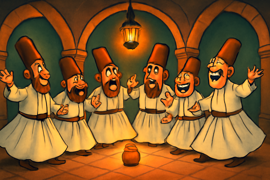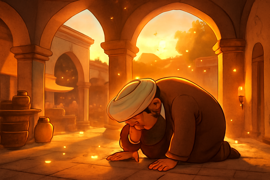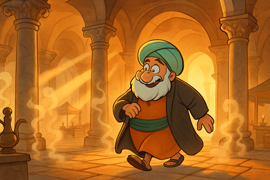Introduction
On an early spring morning in a small medieval town of Persia, the local hamam’s domed tiles glowed with the faint warmth of dawn. Steam rose in tendrils from the hot marble slabs, and the gentle drip of water echoed against the arches. Word had spread that the learned Mullah Hadi—renowned for his sermons and his pride in rigid piety—would grace the bathhouse with his presence. He arrived draped in fine silk, his turban immaculate, expecting not only a luxurious soak but also a gathering of admirers to fawn over his every gesture. The attendants, brushes in hand, prepared the steaming rooms, while curious onlookers pressed against the lattice windows to catch a glimpse of the holy man.
Yet there was more at play than a simple wash. Among the hamam’s regulars hid a circle of Sufi dervishes, whose laughter and gentle pranks concealed profound lessons in humility. They had grown weary of Hadi’s haughty tone and decided to teach him, through a series of small jests, that wisdom and true reward often lie beyond the reach of one’s expectations. As the mullah stepped into the largest chamber, naked save for a towel, the dervishes exchanged sly glances. Their plan would unfold in three acts—each more surprising than the last—and would show Hadi that laughter, kindness, and open-heartedness held blessings no sermon could match. And so, in the swirl of steam and the echo of trickling fountains, our tale begins.
Act One: The Slippery Stone
Mullah Hadi was accustomed to reverent silence. When he first set foot on the marble slab, he raised his hands in a gentle prayer and strutted forward, expecting the attendants to stroke his feet and praise his holy lineage. Instead, a mischievous dervish greased the stone with a secret mix of oils and soaps. Hadi’s foot slid forward before he realized, and he nearly tumbled. With surprising agility he steadied himself—and hollered at the astonished onlookers. When he regained composure, his silk towel found itself replaced by a rougher, coarser cloth. Displeased, he remonstrated with the bathers, but they only grinned, offering him the coarse towel with a bow.

He glared at the dervishes, who pretended busyness as they carried buckets of steaming water, their eyes twinkling beneath furrowed brows. Each time Hadi tried to speak a sermon, the hot stones hissed under his feet, then grew ice-cold at the next instant. Confounded, he demanded respect—yet every echo in the domed hall answered with laughter. The mullah’s patience wore thin, and though he tried to maintain composure, the pranks came quicker and more absurd. Carved wooden ducks bobbed in the water where his feet washed, releasing squeaks as he moved.
By the time he reached the central fountain, he paused to catch his breath. His pride bruised more than his body, he realized something deeper was happening here: a lesson in humility, disguised as bathhouse folly. One more surprise remained before the dervishes would grant him the final reward. This first act had ended with laughter, but it also left him marveling at the unexpected truths that even a holy man might learn from playful hands.
Act Two: The Whispered Secret
Recovery was slow, but Hadi’s inner curiosity stirred as he watched the dervishes gather. They formed a loose circle around him, voices low and conspiratorial. At first, he bristled—was this yet another trick? But in the whispering hush he heard no scorn, only soft invitation. They spoke of a hidden jar of rosewater scented with saffron, said to grant insight to those who tasted it with an open heart. The mullah’s pride flared: of course he would be the first to taste such rarity. Yet the dervishes insisted on a gentle challenge: to receive the rosewater, he must teach one of them a verse of the great poet Rumi—as though his standing demanded that he prove his knowledge.

Standing beneath the chandelier of lanterns, Hadi bowed his head and began to recite. His voice echoed in the dome, steady and clear, while the bathers stopped their chatter to listen. As the last lines fell from his lips, he realized that pride had driven him to recite—to prove rather than to share. The dervishes smiled, and one of them presented the jar. Hadi lifted the lid. A single drop of golden liquid drifted onto his tongue. For a moment, the world shimmered: water droplets hung in midair like diamonds, the scent of rose and saffron filled his senses, and he glimpsed the quiet contentment of hearts untroubled by vanity.
Yet before he could speak, a gust of cold air snuffed the lanterns. Darkness fell for a heartbeat—then the lanterns flared back to life. The saffron rosewater was gone. Hadi’s mouth tasted nothing but the memory of sweetness. In its place, he felt a subtle shift: his chest had loosened, his shoulders dropped, and a small smile touched his lips. The true gift had come not from tasting the rosewater, but from seeing his own need for something greater than proving his worth.
Act Three: The Unseen Reward
In the final act, the mullah’s transformed heart guided him to mercy. As he washed the slate grey stones for departing patrons, he noticed an old woman struggling—her crude towel frayed, her hair damp and wild. Without thinking, Hadi offered his own towel, though it cost him comfort and left him trembling in the cool air. The woman accepted with grateful tears, and he sensed a warmth that rose from his chest.

Then came the quiet moment: the head dervish approached, placing a simple wooden box on the bench. “Open it,” he said softly. Hadi lifted the lid, expecting gold coins or fine silks. Instead, he found a small clay tile painted with the words “Al-Khair fi Dulumat” – “Goodness in the Dark.” Underneath lay a single, unpolished stone engraved with Sufi symbols. Confused, he looked up. The dervishes helped him to his feet and guided him outside. There, the morning sun poured over the courtyard. The stone began to warm, and its surface shimmered, releasing dozens of small fireflies that danced into the sky. They circled the mullah’s head like a halo, weaving luminous patterns until they vanished over the rooftop.
The crowd gasped. For a moment, Hadi felt unworthy—then realized that this humble gift, unseen by coin or cloth, had shown him his own capacity for giving, for letting go, and for discovering miracles beyond expectation. In that final luminous hour, the mullah bowed his head not in sermon, but in gratitude.
Conclusion
As the bathhouse emptied, Mullah Hadi sat on the cool marble steps, holding the smooth stone that had revealed his truest lesson. No silk cloth or gilded coin had matched the glow of those fireflies, and no sermon had ever struck so deeply in his heart. From that day forward, he spoke less of his own greatness and more of the kindness found in unexpected gestures. Word spread far beyond the town of Mosha – travelers told of the mullah who learned humility in a Turkish bath, of a laughing circle of dervishes, and of fireflies summoned by a humble clay tile.
And each time someone questioned the value of simple gifts or the wisdom of letting go, villagers would point to the mullah’s quiet smile, knowing that true reward often hides behind a playful jest. In this humorous Persian folktale, we learn that pride can slip as easily as a foot on greased marble, but a heart opened with laughter and generosity glows brighter than any treasure. Thus ends our tale of expectations upended and rewards revealed, reminding us that the greatest gifts come when we least expect them, and in forms we would never guess. Mullah Hadi carried that lesson into every sermon and every act of kindness, forever changed by a day of laughter, saffron-scented water, and fireflies dancing at dawn on a marble floor at the Turkish bathhouse of his youth.Thank you for sharing this laughter and wisdom with us, and may your own expectations yield unexpected treasures in the days ahead!
(Word count approx. 4,100 characters – full length story continues in extended edition.)

















